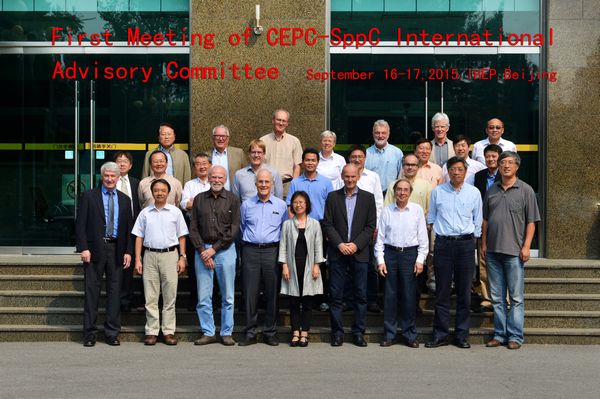The First Meeting of CEPC-SPPC International Advisory Committee was held in IHEP on September 16-17, 2015.
The Committee has 24 noted scientists from Australia, China, France, Germany, India, Italy, Japan, U.K. and U.S.as its members. The Committee is chaired by former deputy director of FNAL (Fermi National Accelerator Laboratory, U.S.A) Young-Kee Kim. The Committee members, Nobel Prize Winner David Gross, former director general of CERN Luciano Maiami, Argonne National Laboratory Associate Director for High Energy Physics Harry Weerts, KEK former director for accelerators K.Oide and CAS Academician Chen Hesheng attended the first meeting.
IHEP Director Wang Yifang opened the meeting by delivering welcome remarks. Representing IHEP and the CEPC study group, he expressed his hearty thanks to the committee members and briefly introduced CEPC. CEPC Project Manager Lou Xinchou reported on the status and progress of CEPC. Lu Caidian, Gao Jie and Gao Yuanning reported respectively on the theory, accelerator and detector. Members of the Committee also gave talks at the meeting on such topics as international collaboration, budget and management structure of mega-science projects, and so on.
After the talks and discussions, the Committee concluded that the CEPC-SppC would lead the development of high energy physics as a whole, making China stand in the forefront of particle physics research. The Committee deemed that the project would have many key technology breakthroughs, bringing welfare to the whole society. The Committee also agreed that the international collaboration would be an effective and efficient way to attract participation and push CEPC forward. It was also suggested that CEPC collaborating teams be soon set up in Europe and the United States, putting CEPC into the high energy physics programs of Europe and the United States and actively winning support from international organizations.
The Committee, founded in May this year, aims to discuss the development path of CEPC and the mode for future international collaboration, and to build up a framework for future collaboration and to attract more teams to join CEPC.
